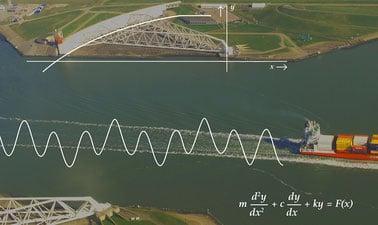MOOC List is learner-supported. When you buy through links on our site, we may earn an affiliate commission.

MOOC List is learner-supported. When you buy through links on our site, we may earn an affiliate commission.
This course allows you to get a solid basis by refreshing and reviewing your bachelor-level calculus.
The course focuses on functions of one variable. In the first 5 weeks you will learn all the basic integration, differentiation and approximation techniques required in a first calculus course of an engineering bachelor education. In the final week these topics will all come together as you solve and analyze several ordinary differential equations.
We use examples that are based on real-life applications so you can practice your mathematical skills in an engineering context. Our courses in calculus offer enough depth to cover what you need to succeed in your engineering master’s or profession in areas such as modeling, physics, fluid dynamics, dynamical systems and more.
This is a review course
This self-contained course is modular, so you do not need to follow the entire course if you wish to focus on a particular aspect. As a review course you are expected to have previously studied or be familiar with most of the material. Hence the pace will be higher than in an introductory course.
This format is ideal for refreshing your bachelor level mathematics and letting you practice as much as you want. Through the Grasple platform, you will have access to plenty of exercises – often with different numbers – and receive intelligent, personal and immediate feedback.
This course is part of our series Mastering Mathematics for Engineers , and together with the course Calculus II part of the program Mastering Calculus.
This course is part of the Mastering Calculus Professional Certificate.
Prerequisites:
Prior knowledge of all the material covered.
In this course we develop the calculus up to a level required for solving and analyzing several important ordinary differential equations. As such the course requires you to have a grasp of or be familiar with pre-university level mathematics including basic elementary functions, trigonometry, algebra and differentiation.
What you'll learn
- Apply differentiation techniques such as the chain rule and implicit differentiation.
- Apply integration techniques such as integration-by-parts and substitution.
- Solve ordinary differential equations that are important in engineering like a damped, forced harmonic oscillator.
- Compute horizontal asymptotes to find equilibria and growth rates.
- Analyze challenging engineering problems using these techniques
Syllabus
Week 1:
- functions
- graphs
- inverse function
- inverse trigonometric functions
- compositions of functions
Week 2:
- differentiation
- tangent lines
- implicit differentiation
- differentiation of inverses
Week 3:
- approximation errors
- linear approximation
- differentials
- Taylor polynomials
- Taylor’s inequality
Week 4:
- horizontal asymptotes
- growth rates
- computing horizontal asymptotes
Week 5:
- integration
- integration by parts
- substitution method
- integration by Taylor polynomial
- integrals over unbounded domains
Week 6:
- differential equations
- direction fields
- first order separable and linear equations
- forced and damped harmonics oscillators
- approximating solutions to differential equations using Taylor polynomials
MOOC List is learner-supported. When you buy through links on our site, we may earn an affiliate commission.
MOOC List is learner-supported. When you buy through links on our site, we may earn an affiliate commission.
